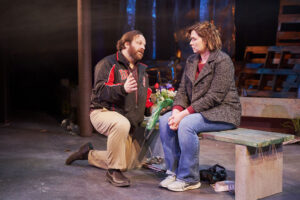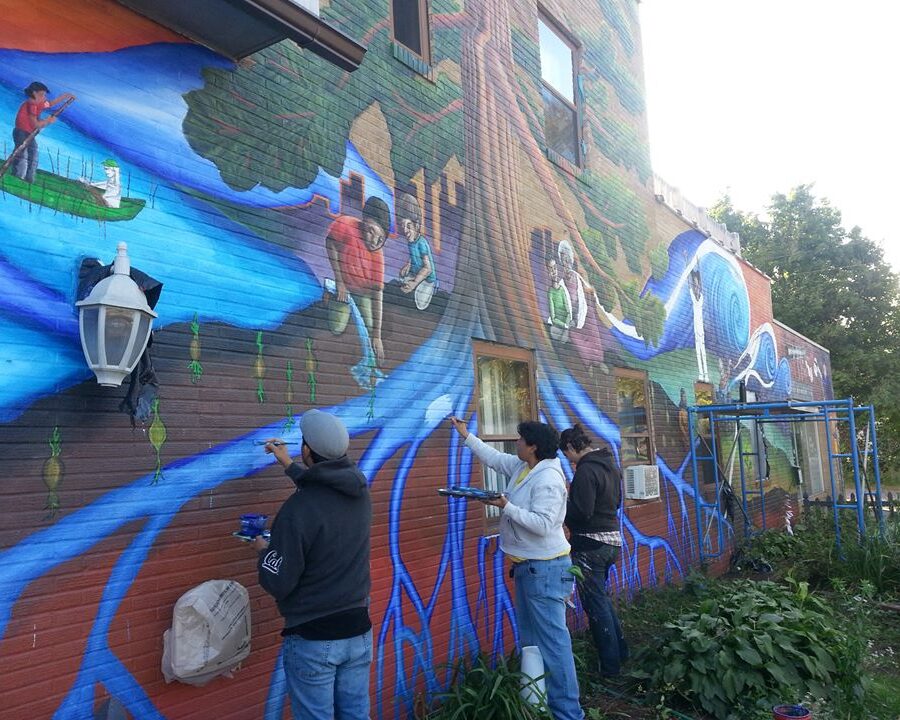
Tommy begs forgiveness and proposes marriage to Darja in Martyna Majok’s ‘Ironbound.’ (Photo/Tony Nelson)
BY KAY SCHROVEN
The Minneapolis Frank Theatre players in “Ironbound” subtly and eloquently connect us to important matters of our time – immigration; women’s independence or lack thereof; domestic violence; class; economic issues; relationships; addiction; and parenting.
Love is a luxury for Darja, a 30-something mother and Polish immigrant living in the industrial, multi-ethnic, working-class Ironbound neighborhood of Newark, N.J. Pulitzer Prize-winner Martyna Majok’s impressive 90-minute play paints a portrait of a woman negotiating to survive, doing her best with what she has.
What she has is a son who is an addict running off with her car; a fellow immigrant former boyfriend (Maks) with a big dream; a live-in boyfriend (Tommy) who cheats on her; two former husbands; a house cleaning job (having lost her factory job); and a real need for stability.
The play’s concept is straightforward and nontraditional in form and language – plain, yet compelling, and professionally played. Brittany D. Parker plays Darja beautifully, with a perfect Polish/English dialect, as well as boldness, humor, compassion and vulnerability. Her life is sketched in snippets over a 20-year period. The only set is a dreamy, yet realistic bus stop, urban and stark, surrounded by discarded car tires, empty pallets, garbage cans, an upturned grocery cart, garbage strewn about, a lone streetlamp, and the wooden bench that Darja occupies throughout. She is waiting for a bus that never arrives –the symbol of a dream, a life that never arrives.
There are four characters, Darja and three others: Maks (played by Benjamin Dutcher), Tommy (Carl Schoenborn), and an unnamed teenage street hustler (Jack Bonko), who provides a surprising lightning bolt of kindness and comic relief. The characters appear and disappear throughout, swirling around Darja who remains on the bench waiting for the bus, except when she stands to boldly face them, argue, hug or kiss them passionately. The men in her life are not in much better shape than she is, gritty, but not without charm, humor and plenty of character. Darja is practical, persistent and resilient, but in a weak position, closing in on homelessness. Her needs trump her wants and she is prepared to negotiate for them.
Cleverly, the play builds unseen characters – Darja’s former husbands, her son, Tommy’s other women (including a wealthy one that Darja cleans for), the bus and the car which we never see but “feel” as they become characters of their own representing freedom and subjugation.
You might say this play is about the American dream versus American reality. There are flaws in the characters and flaws in the American dream. Darja’s circumstances mirror those of millions in the U.S., especially women on their own or dependent on men, often invisible to the culture at large. We see Darja transform from a young, hopeful woman to a disillusioned mature woman. There are no easy answers for her. Survival is how Darja measures success. In the end she chooses the best option she can see; it is dim but not without a ray of light as she preserves her steadfastness and integrity.
Frank Theatre’s “Ironbound” runs through Feb. 11 at the Gremlin Theater in St. Paul.
























